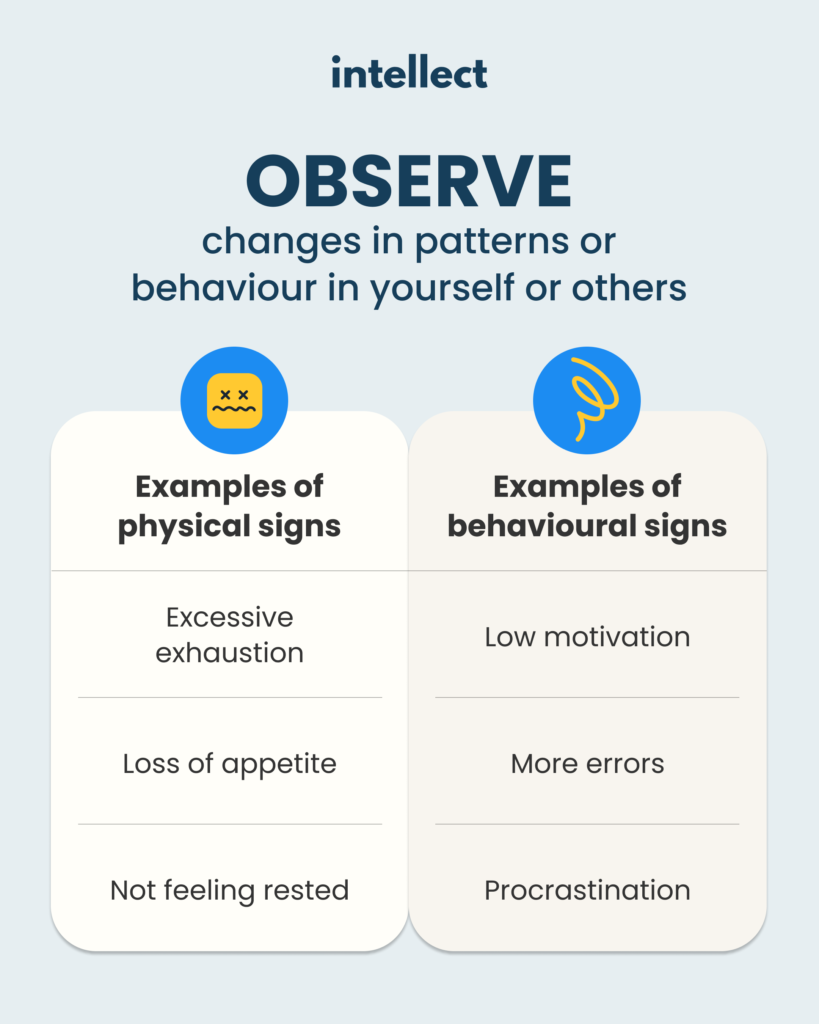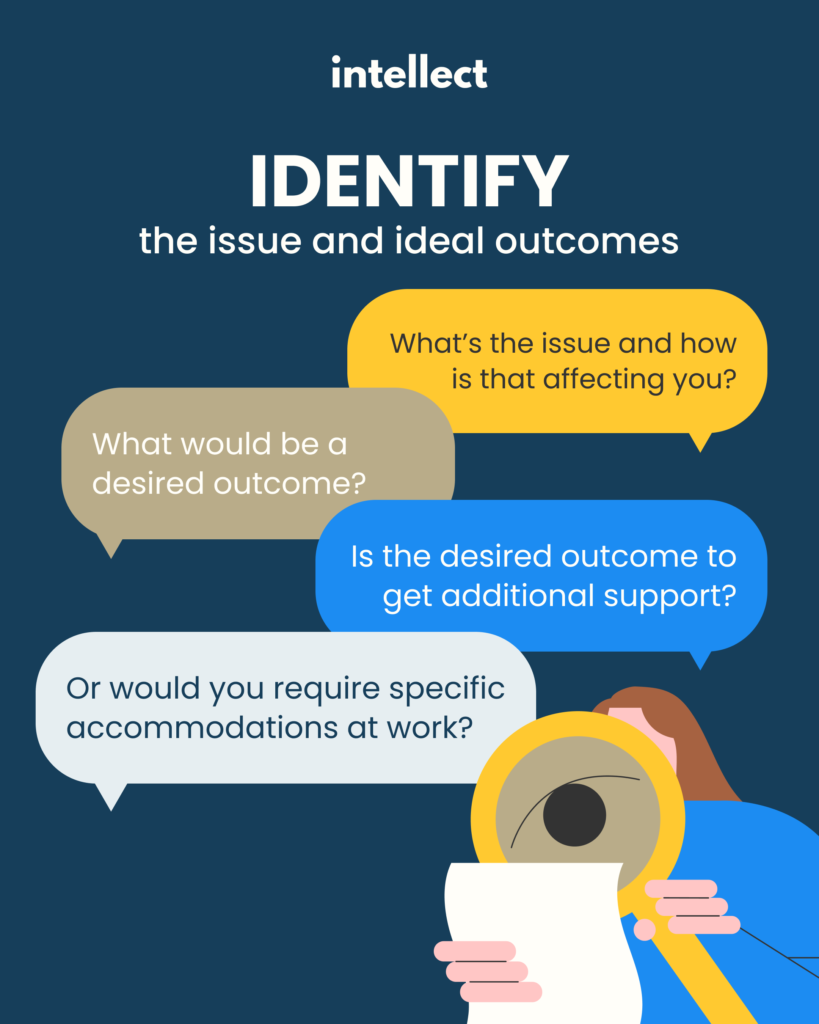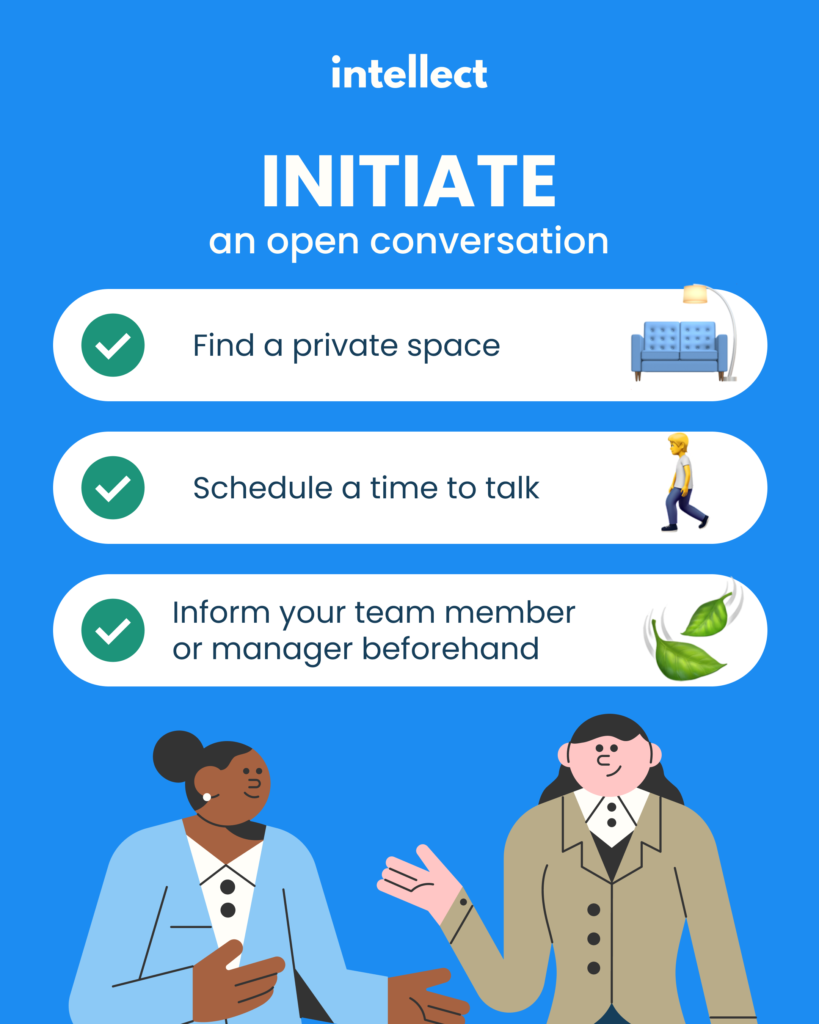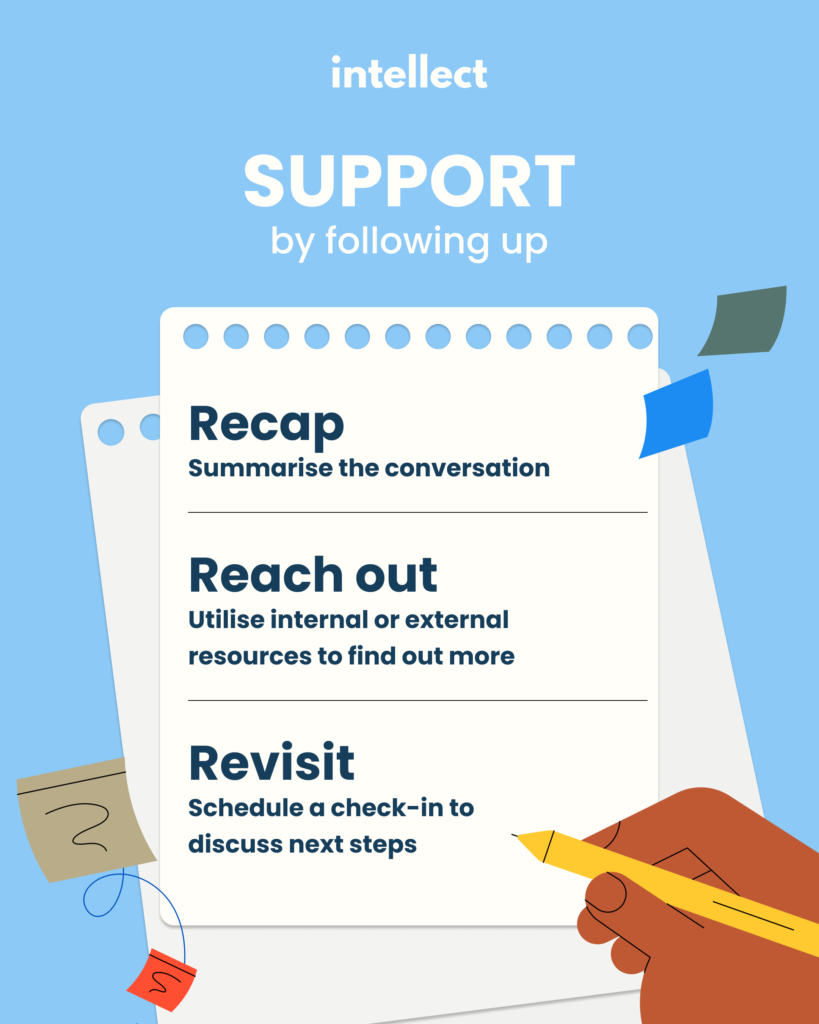Normalising open mental health conversations creates a psychologically safe environment in the workplace. However, a recent study conducted by Deloitte showed that “a worryingly high number of this group of people” still felt uncomfortable discussing mental health challenges, with 33% of Gen Zs opting out of regular catch-ups with their managers to discuss these issues.
When asked if they felt safe discussing mental health with their manager, 31% said, “I want to, but I don’t think my boss can do anything about it,” and 19% said, “I want to, but I don’t think my boss could handle it” — testifying to the importance of breaking that barrier.
In light of this finding, Intellect conducted an interactive workshop at the National Library Board entitled Creating a Supportive Workplace: A Guide to Mental Health Conversations, led by our very own Principal Coaching Program Specialist, Robyn Cam.
During the session, Robyn guided employees through a framework:




Talking to your manager
Let’s take Zac, a Gen Z employee new to the workforce. He is passionate about his work and likes his co-workers, but he is working consistently long hours and isn’t certain if he’s on the right track. He’s been feeling unmotivated with work and wants to have a conversation with his manager, Mary.

Does Zac’s situation sound familiar to you? If so, here’s how you can broach the topic using the framework:
Observe
Be observant of the physical and behavioural changes you’ve been experiencing, such as fatigue, procrastination, and loss of appetite. Ask yourself: How am I feeling? What am I reacting to? What has changed for me?
Identify and initiate
Clarity: Take time to figure out what’s the issue, how it affects you, and the kind of support you need. Knowing the outcome you want to achieve — whether it’s a reduced workload or firmer boundaries — helps you to avoid oversharing or complaining about work in the process.
Setting: Reach out to someone (ideally your manager) who can bring about change in the workplace. Avoid scheduling the conversation at the end of the work day or in a visible area.
Openness: Don’t assume your manager understands what you’re going through. Always give them a chance to ask any questions they may have.
Conversation starters:
- “Hi Mary, can we have a conversation about how I’m coping with my workload and explore possible adjustments?”
- “Some matters in my personal life are affecting my ability to socialise at work. Can I share more about this?”
- ”I’m not working as well as before, and I don’t know why. Can I have some time to discuss this with you?”
Support
- Summarise the main points of the conversation and thank the other party for their time.
- Utilise resources that are available via your organisation’s EAP.
- Schedule a follow-up meeting for a check-in and to discuss next steps.
If you’re a line manager reading this, you may already be empathising with Mary and preparing a response to Zac. Now, let’s shift the focus to you.
Talking to a team member
Say, you lead a team with a diverse mix of generations, experience, and skills, and you maintain good relationships with them. Recently, you’ve noticed that Zac, a reliable team member, seems to be disengaged. Concerned about his wellbeing, you want to find ways to support him.

Using a slightly different framework, you may:
Observe
Curiousity: Strive to be curious about what’s going on with your team member. It’s important not to be dismissive nor make assumptions.
Rapport: Managers need to build their employees’ confidence so they feel comfortable reaching out and asking for help. Guiding that conversation starts with regular 1:1 check-ins.
Engage
Check-ins: Schedule regular check-ins on workload, happiness level, and career goals and timelines. A weekly cadence is recommended, especially when a team member faces challenges appears vulnerable. That said, it’s essential to check in with them during good times as well, to celebrate small wins and reframe roadblocks as learning opportunities.
Empathy: Avoid oversharing or starting to complain about your work during the conversation. Instead, learn how to listen actively and respond from a place of compassion .
Conversation starters:
- “Hey Zac, I haven’t had a chat with you in a while. I’d love to take just five minutes out — can we schedule some time for that?”
- “I noticed you seem quite stressed lately, and I want to support you. Would you prefer we talk at work or go to a coffee shop?”
Collaborative problem-solving
Attention: Enter the conversation with the intention to listen and understand and remember that a manager doesn’t always have all answers. Focus on asking clarifying questions and co-creating solutions together.
Boundaries: While you may support your teammate’s needs in the workplace, you do not need to take full responsibility for your team member’s wellbeing. Instead, encourage them to seek support from a mental health professional. You may reach out to HR to see what resources are available, but don’t promise any solutions if you’re unsure.
Verbal cues:
- “How can I help and support you?”
- “I will speak with the team to see how we can work around these project assignments.”
- “What do you need to be supported and engaged at work?”
- “Have you connected with a professional?”
Our eBook How to Talk about Mental Health with your Employees contains more expert tips from Intellect’s clinical team.

Ultimately, mental health is both an individual and organisational responsibility. Robyn emphasised that as adults, we are responsible for our own health. It is our personal duty to observe and check in with ourselves, and continue to revisit and refine as we go along.
“People need to take responsibility for themselves, but at the same time, there must be a strategy for managers and HR to create change within the workplace,” Robyn shared.
Another first step to make employees more comfortable would be seeking help first from a third-party professional before starting a conversation with their manager, and this is where coaching comes in.
How Intellect can help
At Intellect, our pool of coaches provide your employees with a safe space. Here, they can freely dive into their thoughts, feelings, and challenges without fear of judgement, boosting self-awareness and acquiring valuable coping skills.
But here comes the real game-changer: coaching empowering employees to communicate more effectively with their managers. No more beating around the bush or awkward silences; instead, both parties are capable of having open and constructive dialogues about mental health concerns. For organisations like Tech in Asia and Shopback, this shift has transformed workplace culture altogether.
Learn more about replicating their success for your organisation here.








